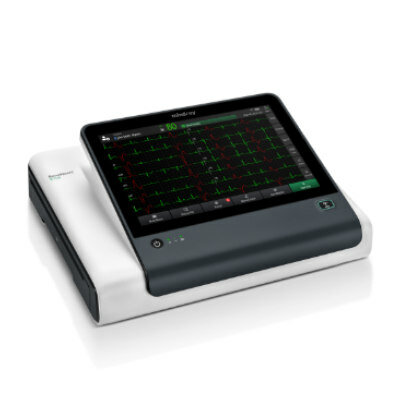Computer-Based Tutorial Teaches Doctors Empathy
|
By HospiMedica International staff writers Posted on 16 Nov 2011 |
A new interactive training tool helps oncologists respond more empathically to their patients, enhancing patient trust and improving their quality of life.
Researchers at Duke University (Duke, Durham, NC, USA) conducted a randomized, controlled, parallel-group trial to test whether a brief, computerized intervention improves oncologist responses to patient expressions of negative emotion. In all, 48 medical, gynecologic, and radiation oncologists were randomly assigned to receive a communication lecture, or the lecture plus a CD-ROM about responding to patients' negative emotions. The CD taught the doctors basic communication skills, including how to recognize and respond to opportunities in conversations when patients share a negative emotion, and how to share information about prognosis.
The researchers used audio recordings of the oncologists' conversations with 264 patients with advanced cancer to identify the number of empathic statements and responses to patients' expressions of negative emotion. The results showed that oncologists in the intervention group used more empathic sayings and were more likely to respond to negative emotions empathically than the control oncologists. They were also better at eliciting patient concerns, using tactics to promote conversations rather than shut them down. Patients of intervention oncologists reported greater trust in their oncologists than did patients of control oncologists. The study was published in the November 1, 2011, issue of Annals of Internal Medicine.
“Earlier studies have shown that oncologists respond to patient distress with empathy only about a quarter of the time,” said lead author James Tulsky, MD, director of the Duke Center for Palliative Care. “Often, when patients bring up their worries, doctors change the subject or focus on the medical treatment, rather than the emotional concern. Unfortunately, this behavior sends the message, 'this is not what we're here to talk about'.”
“Oncologists are among the most devoted physicians -- passionately committed to their patients. Unfortunately, their patients don't always know this unless the doctors articulate their empathy explicitly,” added Dr. Tulsky. “It's a skill set. It's not that the doctors are uncaring, it's just that communication needs to be taught and learned.”
Related Links:
Duke University
Researchers at Duke University (Duke, Durham, NC, USA) conducted a randomized, controlled, parallel-group trial to test whether a brief, computerized intervention improves oncologist responses to patient expressions of negative emotion. In all, 48 medical, gynecologic, and radiation oncologists were randomly assigned to receive a communication lecture, or the lecture plus a CD-ROM about responding to patients' negative emotions. The CD taught the doctors basic communication skills, including how to recognize and respond to opportunities in conversations when patients share a negative emotion, and how to share information about prognosis.
The researchers used audio recordings of the oncologists' conversations with 264 patients with advanced cancer to identify the number of empathic statements and responses to patients' expressions of negative emotion. The results showed that oncologists in the intervention group used more empathic sayings and were more likely to respond to negative emotions empathically than the control oncologists. They were also better at eliciting patient concerns, using tactics to promote conversations rather than shut them down. Patients of intervention oncologists reported greater trust in their oncologists than did patients of control oncologists. The study was published in the November 1, 2011, issue of Annals of Internal Medicine.
“Earlier studies have shown that oncologists respond to patient distress with empathy only about a quarter of the time,” said lead author James Tulsky, MD, director of the Duke Center for Palliative Care. “Often, when patients bring up their worries, doctors change the subject or focus on the medical treatment, rather than the emotional concern. Unfortunately, this behavior sends the message, 'this is not what we're here to talk about'.”
“Oncologists are among the most devoted physicians -- passionately committed to their patients. Unfortunately, their patients don't always know this unless the doctors articulate their empathy explicitly,” added Dr. Tulsky. “It's a skill set. It's not that the doctors are uncaring, it's just that communication needs to be taught and learned.”
Related Links:
Duke University
Latest Patient Care News
- Portable Biosensor Platform to Reduce Hospital-Acquired Infections
- First-Of-Its-Kind Portable Germicidal Light Technology Disinfects High-Touch Clinical Surfaces in Seconds
- Surgical Capacity Optimization Solution Helps Hospitals Boost OR Utilization

- Game-Changing Innovation in Surgical Instrument Sterilization Significantly Improves OR Throughput
- Next Gen ICU Bed to Help Address Complex Critical Care Needs
- Groundbreaking AI-Powered UV-C Disinfection Technology Redefines Infection Control Landscape
- Clean Hospitals Can Reduce Antibiotic Resistance, Save Lives
- Smart Hospital Beds Improve Accuracy of Medical Diagnosis
- New Fast Endoscope Drying System Improves Productivity and Traceability
- World’s First Automated Endoscope Cleaner Fights Antimicrobial Resistance
- Portable High-Capacity Digital Stretcher Scales Provide Precision Weighing for Patients in ER
- Portable Clinical Scale with Remote Indicator Allows for Flexible Patient Weighing Use
- Innovative and Highly Customizable Medical Carts Offer Unlimited Configuration Possibilities
- Biomolecular Wound Healing Film Adheres to Sensitive Tissue and Releases Active Ingredients
- Wearable Health Tech Could Measure Gases Released From Skin to Monitor Metabolic Diseases
- Wearable Cardioverter Defibrillator System Protects Patients at Risk of Sudden Cardiac Arrest
Channels
Critical Care
view channel
Ingestible Smart Capsule for Chemical Sensing in the Gut Moves Closer to Market
Intestinal gases are associated with several health conditions, including colon cancer, irritable bowel syndrome, and inflammatory bowel disease, and they have the potential to serve as crucial biomarkers... Read moreNovel Cannula Delivery System Enables Targeted Delivery of Imaging Agents and Drugs
Multiphoton microscopy has become an invaluable tool in neuroscience, allowing researchers to observe brain activity in real time with high-resolution imaging. A crucial aspect of many multiphoton microscopy... Read more
Novel Intrabronchial Method Delivers Cell Therapies in Critically Ill Patients on External Lung Support
Until now, administering cell therapies to patients on extracorporeal membrane oxygenation (ECMO)—a life-support system typically used for severe lung failure—has been nearly impossible.... Read moreSurgical Techniques
view channel
Pioneering Sutureless Coronary Bypass Technology to Eliminate Open-Chest Procedures
In patients with coronary artery disease, certain blood vessels may be narrowed or blocked, requiring a stent or a bypass (also known as diversion) to restore blood flow to the heart. Bypass surgeries... Read more
Intravascular Imaging for Guiding Stent Implantation Ensures Safer Stenting Procedures
Patients diagnosed with coronary artery disease, which is caused by plaque accumulation within the arteries leading to chest pain, shortness of breath, and potential heart attacks, frequently undergo percutaneous... Read more
World's First AI Surgical Guidance Platform Allows Surgeons to Measure Success in Real-Time
Surgeons have always faced challenges in measuring their progress toward surgical goals during procedures. Traditionally, obtaining measurements required stepping out of the sterile environment to perform... Read moreHealth IT
view channel
Printable Molecule-Selective Nanoparticles Enable Mass Production of Wearable Biosensors
The future of medicine is likely to focus on the personalization of healthcare—understanding exactly what an individual requires and delivering the appropriate combination of nutrients, metabolites, and... Read more
Smartwatches Could Detect Congestive Heart Failure
Diagnosing congestive heart failure (CHF) typically requires expensive and time-consuming imaging techniques like echocardiography, also known as cardiac ultrasound. Previously, detecting CHF by analyzing... Read moreBusiness
view channel
Expanded Collaboration to Transform OR Technology Through AI and Automation
The expansion of an existing collaboration between three leading companies aims to develop artificial intelligence (AI)-driven solutions for smart operating rooms with sophisticated monitoring and automation.... Read more

















